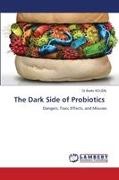Mehr lesen
Probiotics are widely promoted as safe and beneficial, yet growing evidence indicates that their risks are underestimated. This book provides a critical, interdisciplinary examination of probiotics across diverse domains, including dietary supplements, cosmetics, public health, and environmental applications. Drawing on systematic reviews, clinical data, regulatory analyses, and bioethical debates, it demonstrates how issues such as mislabeling, overdosing, antibiotic resistance, diagnostic confusion, underreporting of adverse effects, and ecological disruption challenge the assumption of inherent safety. The chapters emphasize that probiotics are not neutral "superfoods," but biologically active agents requiring rigorous evaluation, standardization, and governance. By reframing probiotics as interventions with pharmacological and ecological consequences, this volume calls for stricter regulation, improved consumer protection, and evidence-based risk-benefit assessments. Ultimately, it argues for a paradigm shift: integrating probiotics into public health policy with the same level of scrutiny as pharmaceuticals, while maintaining awareness of their therapeutic promise.
Über den Autor / die Autorin
Dr. Badis Aouzal is a researcher at the University 20 August 1955, Skikda (Algeria), working in the Laboratory of Biodiversity, Ecosystem Interactions, and Biotechnology. His research focuses on animal ecophysiology, toxicology, phytochemistry, and phytoremediation, with several publications on the antioxidant and hepatoprotective effects.

